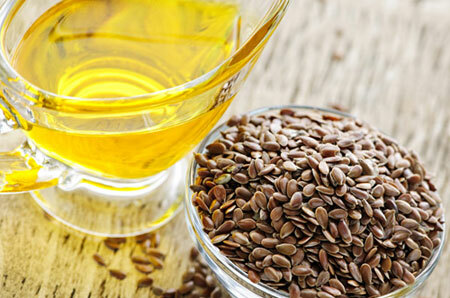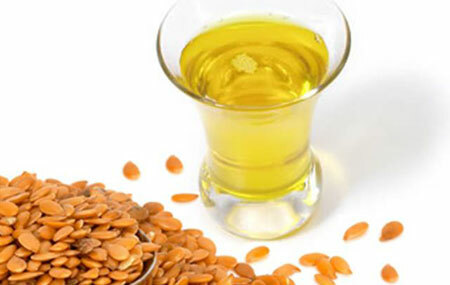Flaxseed oil is used in the prevention and the complex treatment of many diseases. This is the richest source of unsaturated fatty acids omega, necessary for many biochemical processes of the body and useful in atherosclerosis, diabetes and other pathologies.
The healing properties of the product were evaluated in ancient times and have not been forgotten to this day. What are the properties of flaxseed oil, its benefits and harm and how to take the remedy?
Contents
- 1 What is the use of flaxseed oil and how to take it?
- 1.1 Properties of flaxseed oil
- 1.2 Use for female health
- 1.3 Weight loss use
- 2 How to take flaxseed oil?
- 3 Flaxseed oil harm
- 4 Flaxseed oil contraindications
- 5 What should I look for when choosing?
- 5.1 How much flax seed oil is in a tablespoon?
- 5.2 Storage
What is the use of flaxseed oil and how to take it?

The effectiveness of flax seeds for the treatment of diseases was written by healers and philosophers of antiquity - Hippocrates and Ibn Sina. Flax was used to heal from ulcers, cough, pneumonia, kidney and bladder diseases. Properties of flax seeds were appreciated by the ancient Slavs, Egyptians, Romans and other peoples.
Composition of
oil Flaxseed oil is made from flax seeds, it has a yellow, yellowish brown or greenish yellow hue and a slightly bitter flavor.
Useful substances present in the product:
- Unsaturated fatty acids - up to 60% linolenic, linoleic and oleic - omega 3, 6 and 9 respectively( these and some other acids together constitute vitamin F);
- Retinol and tocopherol( vitamins A and E);
- Lignin-active polysaccharides;
- Mineral substances;
- Saturated acids - up to 10%.
The value of flaxseed oil is a high level of omega acids - they are not produced in the body, but are necessary for it. By their content, the facility is inferior to nuts, soy and seafood, including fish oil.
The omega acids present in linseed oil are useful for the health of blood vessels, skin, joints, hair, intestinal mucosa, stomach and other systems and organs. The daily requirement for these compounds satisfies 1.5 st.l.oil.
Properties of linseed oil
Due to the ratio of compounds in the composition, flaxseed oil accelerates the accumulation of accumulated toxins and toxins, and cleanses the thick and small intestines, kidneys, stomach, and bladder with constant use.
The product has a mild laxative and choleretic effect, normalizes blood clotting, improves metabolism in cells, helps the skin to remain supple and healthy.
The use of flaxseed oil helps to lower the level of cholesterol in the blood and is useful for the prevention of atherosclerosis, coronary heart disease, diabetes and stroke( according to the Institute of Nutrition RAS).
Thanks to the omega-acids entering the oil, the risk of developing thrombosis decreases - it is recommended that hypertension, asthmatics, people suffering from insulin-dependent diabetes, psoriasis, sclerosis, arthritis be included in the daily diet.
Other properties of linseed oil:
- Strengthens the immune system, stimulates the activity of T-lymphocytes;
- Normalizes the activity of the digestive system - it helps in the therapy of gastritis, colitis, constipation, heartburn, liver diseases;
- Improves the functioning of the kidneys, accelerates the removal of excess fluid in obesity and edema;
- Promotes sperm production;
- Has a beneficial effect with neuroses, depressive states, mental disorders( addictions, schizophrenia);
- Reduces the intensity of allergic reactions.
The product is effective in inflammatory diseases of the oral cavity. With bleeding gums, tonsillitis, stomatitis, carious lesions it is used, rassasyvaya 1-2 tsp.means 5-7 minutes, then spitting out the remaining oil.
The Benefit of Women's Health
The use of flaxseed oil for women is invaluable - taking it is useful for the relief of PMS and in the premenopausal period, to preserve the youthfulness of the skin.
Omega 3-6-9 acids are necessary for the correct formation of the child's brain in the prenatal period, so linen little in moderate amounts benefits pregnant women.
However, in the second half of pregnancy, it should not be abused, as it can increase the risk of early birth( according to a study by the University of Sainte-Justine).
Weight loss benefit
Flaxseed oil is suitable for use in dietary nutrition, replacing them in part with animal fats. It facilitates the maintenance of low-calorie diets, stimulating the saturation zone in the brain and reducing the feeling of hunger. Flax oil for weight loss is also useful because it speeds up the movement of food through the intestines, reducing the absorption of calories and facilitating purification.
The product normalizes lipid metabolism, which increases the activity of fat splitting and accelerates metabolism in general, and excretion of cholesterol cleanses blood and blood vessels, improves heart function, which is also useful in getting rid of excess kilograms.
Flaxseed oil helps to reduce puffiness, which is also important, because with obesity in connective tissue loops of subcutaneous fat accumulates a lot of water.
Withdrawal of excess fluid also contributes to easier and more harmonious operation of the internal organs. As a source of unsaturated fatty acids, this oil is indispensable for vegetarians as a substitute for fish and seafood.
How to take flaxseed oil?

- For the treatment of diseases and for prophylaxis, linseed oil can be consumed either separately or by adding to ready-made dishes - salads, porridges. In a day you do not need to take more than 2 tbsp.l.product to adults, and more than 1 tbsp.l. For children.
- In the treatment of diseases, it is considered correct to take the product on an empty stomach in the morning for 30-60 minutes before breakfast or twice or thrice a day for 0.5-1 st.l.before meals.
- For general strengthening of the body it is better to add it to food, mixing with honey, yogurt, cheese, fruits, sauces, raw, baked or boiled vegetables. Well combined with linseed oil, cottage cheese, fermented baked milk, kefir, beets, yogurt, carrots, sour cabbage.
Linen little can not be heat treated( fry on it, add to hot dishes) - while it not only loses its properties, but also becomes harmful due to the formation of oxidation products - free radicals.
External remedy is used for burns, arthritis, for healing of skin lesions, applying compresses or moist bandages for the night. To feed the fading and flabby skin it is useful to make homemade masks from pure linseed oil or with the addition of honey, sour cream, aloe juice, other oils and aromatic phyto essences.
Flaxseed oil harm
In addition to its beneficial properties, damage to flaxseed oil can bring in some cases - when stored in an open container, under the influence of light and when heated, and when using an expired product.
Rancid linseed oil contains ketones, aldehydes and other dangerous compounds for health.
Exceeding the recommended daily dose may cause side effects, for example:
- Diarrhea;
- Rarely - allergies, rashes, swelling;
- Reductions in blood clotting;
- Risk of preterm delivery with oil in the 2-3 trimester of pregnancy.
Contraindications of linseed oil
To drink linseed oil is prohibited in the following cases:
- Hepatitis;
- Keratitis( inflammation of the cornea);
- Gallstone disease;
- Pancreatitis;
- Polyps of the uterus and appendages;
- Pregnancy II-III trimesters( at 1-12 weeks and with breastfeeding only after consulting a doctor);
- Severe diarrhea;
- Exacerbation of cholecystitis;
- Individual intolerance;
- Poor blood clotting.
With stones in the gallbladder, linseed, like any other vegetable oil, can not be taken in its pure form. This can provoke the development of a pain attack.
The use of linseed oil is prohibited when taking antidepressants, hormonal, antiviral, laxative, analgesic, antidiabetic and antithrombotic agents.
What should I look for when choosing?
The correct linseed oil should be in a dark glass container and do not have a sharp bitter smell. The maximum of useful compounds is found in the product obtained by cold pressing. Such oil is more fresh on taste, has less bitterness in comparison with that received by hot pressing.
Pay attention to the expiration date - it is better if no more than 2 months have passed since the date of manufacture at the time of purchase. Choose products of proven manufacturers, for example, Ecolen, Kronos oil, Sabo, Compass of Health.
The optimum volume is 200-250 ml, the oil in such packaging is used more quickly and the risk of its rancidity is less than that of the product in a large container( 0.5 l and more).
How much flax seed oil is in a tablespoon?
One tablespoon of linseed oil contains about 20 g of product and 120 kcal. Calories in linseed oil are 884 kcal per 100 g.
These values may vary slightly depending on the manufacturer and the additives used.
Storage
Proper storage of linseed oil:
- In dark glass containers;
- In the dark place;
- Within a month after the opening;
- In the refrigerator on the door or in a dark cool place, the temperature in which is not above + 25 ° C.



